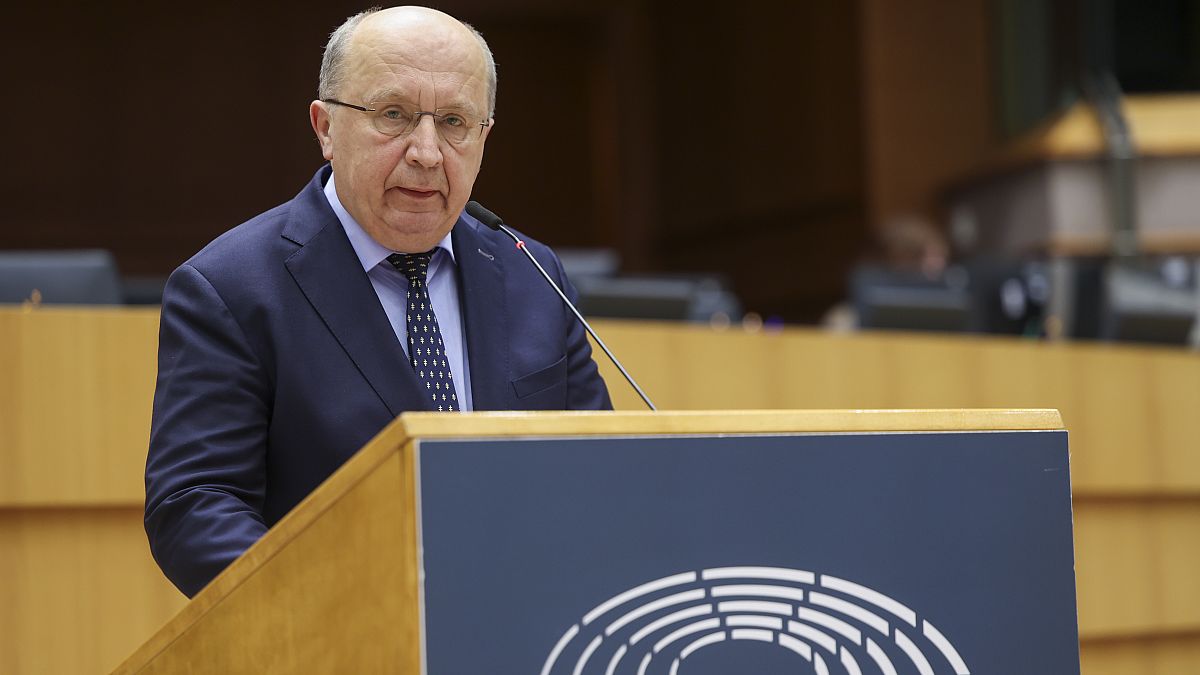The EU’s new defence commissioner is open to eurobonds

Lithuanian commissioner hopeful Andrius Kubilius told Euronews he’s urgently looking to raise billions – including via the controversial idea of joint borrowing.
The EU’s first defence and space commissioner is open to issuing joint bonds or using unspent money from post-pandemic funds to raise vital funds for building up the military and boosting competitiveness.
The former Lithuanian prime minister, tentatively awarded the post yesterday (17 September), still has to be approved by the European Parliament, but he already sees several possibilities to raise much-needed additional finance in future.
“We are looking at how we can raise money as quickly as possible,” Kubilius, currently an MEP in the centre-right European People’s Party, told Euronews after his appointment, adding: “we have the theoretical possibility of common debt.”
While funding for defence could be hiked in the next seven-year budget framework, “that will not come until 2028. We do not have the luxury to wait until 2028,” he said.
Kubilius also mentioned redirecting unspent money from the EU’s post-pandemic Recovery Fund (RRF), using the financial sector bailout pot the European Stability Mechanism, or mobilising finance from the European Investment Bank and private institutions.
Mario Draghi, ex-Prime Minister of Italy, has also suggested issuing joint EU bonds to raise some of the additional €750bn to €800bn the bloc needs per year to stay competitive. Others have suggested joint borrowing to fund specific projects, such as a proposed EU air defence system.
Yet the eventual solution will have to be agreed with member states, Kubilius admitted —and the likes of Germany and the Netherlands have strongly rejected Draghi’s call.
Coordinating with Kallas
Since von der Leyen promised to create Kubilius’ new defence post earlier this year, analysts have warned of a potential overlap with the work of Estonia’s Kaja Kallas, who will succeed Josep Borrell as the EU’s top diplomat.
“When you talk to people about a defence commissioner, they think of a defence minister like at national level,” Sven Biscop, professor of European foreign and defence policy at the University of Ghent, told Euronews, adding that an EU commissioner can’t decide on military operations or influence budgets.
In a letter sent to Kubilius, von der Leyen was clear the Lithuanian would need to coordinate with Kallas, but suggested he could do more in economic areas such as investment, procurement, and research.
“Member states and NATO are really taking care of military defence plans, deterrence plans. And I think that the EU is not going to move into this area, but the EU has the possibility to help member states and NATO with its power to raise additional resources for defence,” Kubilius told Euronews.
Von der Leyen has charged Kubilius with stimulating public and private investment in defence, designing a European air defence shield, boosting military mobility and creating a single market for the defence and space industries.
Once the new Commission is in place, one of Kubilius’ first missions will be to present defence paper with Kallas, to find opportunities for collective investment.
World News || Latest News || U.S. News
Source link



